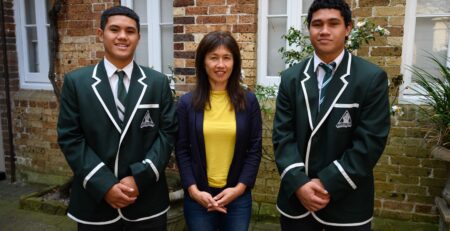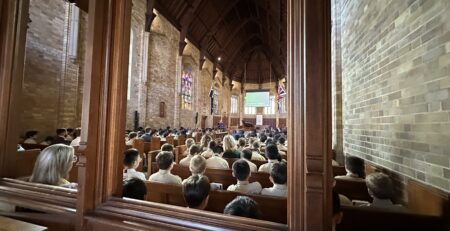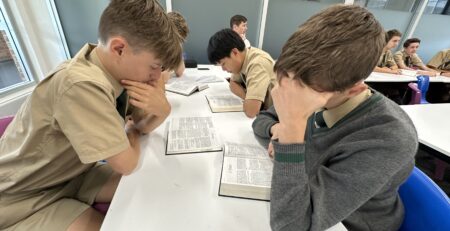Prep | Year 2 News
Unit of Inquiry- Where We Are in Place and Time
Central Idea: Shared histories shape our communities
In the last few weeks of our unit of inquiry, the boys have been learning through our key concepts change, perspective and connection.
The lines of inquiry that have been driving learning are:
- What shapes a community’s identity? (PERSPECTIVE)
- How and why communities change? (CHANGE)
- How have communities changed and how are they changing now? (CHANGE)
- Connections between past and present (CONNECTION)
We have been inquiring into Trinity’s history and identity, and how the people of Trinity, including the Year 2 boys, help shape the identity of our School. To explore the key concepts of change and perspective further, last week the boys headed back in time, to a school day in 1877! (UOI photos 1,2,3)
The boys started the day with a marching drill and some guided exercises, followed by a spelling lesson on slate. In the classroom they learned about the dangers of talking, being left-handed and the dreaded cane. The boys left the 1870s classroom with a new appreciation for the ability to collaborate, communicate and celebrate each other in their Trinity classrooms.
A highlight of the day was a treasure hunt to find artefacts and primary sources that would have been part of everyday school life in the 1870s. The boys inquired into the function of each artefact and wondered how things that are part of their everyday school day now may be viewed by people in the future.
Upon returning to school, the boys talked about their experiences through the conceptual lenses of change, perspective and connection (UOI photo 4). You can continue the conversation at home by talking about how school has changed since you were at school.




Maths
This week and next week, the boys will be learning about systems we use
to measure time. Last week, the boys inquired into timelines, and learned how timelines are a tool for recording important events that happen throughout history. Timelines link to our Unit of Inquiry learning, and many of the boys made this connection when talking about the timeline of our Trinity community.
The boys used their new understandings to create their own timelines of important events in their lives and learned the meaning of the words significant and chronological to help them structure their timeline effectively and in a way that could communicate to an audience. Next week, they will begin to inquire into calendars and discover that calendars are essential in helping us organise our days, weeks, months and years. To help your son with his mathematical learning at home, you could have a calendar on his bedroom wall or in a prominent place at home so he can begin planning out his days and special events, and can further his self-management skills.
English
Reading-Aloud: Inspiring a Love of Reading.
During our Growth conversations, it has been a pleasure to discuss all aspects of your son’s learning. A great support for learning across all disciplines is to encourage and inspire a love of reading. We are so happy that many of our boys are avid readers and are beginning to engage independently in more extended and varied texts. This form of reading plays a very important part in learning, but one should never forget the impact reading aloud to a child can have.
The nightly ritual of reading before bed is one that has a marked impact on both academic and social-emotional development. Most importantly, research conducted by Scholastics Australia highlights that as adults, we need to act as reading role models, with reading aloud being a predictor of strong reading frequency and enjoyment in children. Additionally, reading aloud has been found to be the most significant factor in improved literacy levels of young children, supporting reading comprehension, language and vocabulary development, understanding of texts and cognitive growth. Finally, sharing reading can often provide a time within our very busy weeks to reconnect and relax with our children, enhancing emotional connections and reducing stress.
Sadly, read-aloud frequency diminishes as students get older and are able to read independently, with only 21% of 9-11-year olds regularly being read to. While our Year 2 learners are becoming fluent readers, we would like to encourage families to continue to share daily reading time. In class, we read aloud frequently, with many of our learners noting it as being one of the most enjoyable learning experiences of the week.
With the rise of audio books, listening to texts is clearly something that we can enjoy well into adulthood. Perhaps you can share your childhood favourite or go on a new adventure following your son’s interests. We would love to hear all about the books you are reading aloud at home, so make sure they are included in your son’s Record Book reading log. Happy Reading!
Additional information on the impact reading aloud can have on student learning can be found at:
https://www.scholastic.com/readingreport/home.html
https://www.education.vic.gov.au/documents/about/research/readtoyoungchild.pdf
https://news.osu.edu/a-million-word-gap-for-children-who-arent-read-to-at-home/

Music
In Classroom Music the Year 2 boys have continued their inquiry into the stand alone unit of inquiry presented by Musica Viva called Timmy and the Breakfast Band. Throughout the unit they have constantly made connections between music and emotions, music and movement and folk music using the Musica Viva stimulus material. They have explored the concepts of connection, change and perspective and continue to develop music notation and creative skills by learning the art of graphic notation and how to be a Foley Artist to recreate sound effects for a scene from the Peter Rabbit movie. They have also used iMovie and GarageBand to assist in describing their learning and understanding of sequence, structure and tone quality. These activities developed their understanding of music elements such as rhythm, form, tone quality and dynamics. They have also continued their involvement in the Strings Program learning new repertoire, sight-reading and ensemble skills ready for the concerts this week.



















